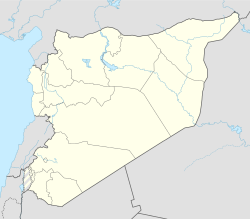This article includes a list of general references, but it lacks sufficient corresponding inline citations. (July 2008) |
Deir Atiyah or Dayr Atiyah (Arabic: ديرعطية) is a town in Syria, located between the Qalamoun Mountains and the Eastern Lebanon Mountains Series, 88 kilometres (55 mi) north of the capital Damascus and on the road to the city of Homs. According to the Syria Central Bureau of Statistics (CBS), Deir Atiyah had a population of 10,984 in the 2004 census.[1]
Deir Atiyah
ديرعطية | |
|---|---|
| Coordinates: 34°05′N 36°46′E / 34.083°N 36.767°E | |
| Country | Syria |
| Governorate | Rif Dimashq |
| District | An-Nabek |
| Subdistrict | Deir Atiyah |
| Control | |
| Elevation | 1,250 m (4,100 ft) |
| Population (2004 census)[1] | |
• Total | 10,984 |
Deir Atiyah enjoys a moderate climate in summer and cold in the winter as it is located at an altitude of 1,250 metres (4,100 ft) above sea level.
The proximity to a desert region, where the average rainfall does not exceed more than 125 millimetres (4.9 in) annually, means that environmental conditions, including poor soil, does not provide adequate resources to economically sustain the local population. Many locals immigrated to the Americas in the early 20th century, to the Persian Gulf countries after the emergence of job opportunities there, and to East Asia.[citation needed]
Agriculture
editFarmers cultivate grapes, apricots, cherries, figs and other fruits.
Deir Atiyah benefits from groundwater located in its valley.
Deir Atiyah has a number of windmills (sometimes referred to as Air Wheels). The power generated by the windmills is used to pump water from deep wells. The origins of the windmills are not known, but they are reported to be a major source of power to pump water for agriculture for more than a hundred years.[2][3]
Culture
editDeir Atiyah has a museum, a sports center and cultural center. In 2003, the first private university in Syria, University of Kalamoon, was opened in Deir Atiyah.
People in Deir Atiyah consume a hot drink called Mate, which Syrian expatriates brought and introduced from South America. The invitation "Come and drink Mate" is typical of this region's hospitality. The invitation implies not only the sharing of a drink, but also a meal.
History
editHistorians match the name of this city with a supposed Roman or Byzantine official, Theodorus Paulus, whose first name means "Gift of God" (Arabic: عطاء الله). This name has been associated in minds of successive generations in Dair Atiah for more than thousand years.[citation needed]
A number of ancient Roman channels can be found in Yabroud,[4] close to Deir Atiyah.
In 1838, its inhabitants were predominantly Sunni Muslims and Greek Orthodox Christians.[5]
Main sights
edit- The Museum of Deir Atiyah: The Museum of Deir Atiyah is one of the biggest and richest museums in Damascus suburb, Reif Dimashq. It contains the heritage and folklore of the region.
- The Canonical Museum of Deir Atiyah
- The Cultural Palace of Deir Atiyah
- The Village of Special Needs
- Hammam el-Souk el-Tahtanye
Civil War
editDeir Atiyah was affected by the Syrian civil war, like any Syrian town and city in Damascus suburbs. It underwent multiple attacks from both the Syrian Armed Forces, and opposition groups. The major impact was in 2013 and 2014.
References
edit- ^ a b General Census of Population and Housing 2004. Syria Central Bureau of Statistics (CBS). Rif Dimashq Governorate. (in Arabic)
- ^ "Save The Environment: let's build more Air Wheels". DAirAtiah Blog. 2006-12-19. Retrieved 2008-07-30.
- ^ "DairAtiah.com" (in Arabic). Archived from the original on 2020-10-31. Retrieved 2008-07-04.
- ^ "YabroudOnline.com" (in Arabic). Retrieved 2008-07-05.
- ^ Smith, in Robinson and Smith, 1841, vol 3, 2nd appendix, p. 173
Bibliography
editExternal links
edit- Dara3ta.com (in Arabic)
- DairAtiah.net (in Arabic)
- DairAtiah.com Archived 2020-10-31 at the Wayback Machine (in Arabic)
